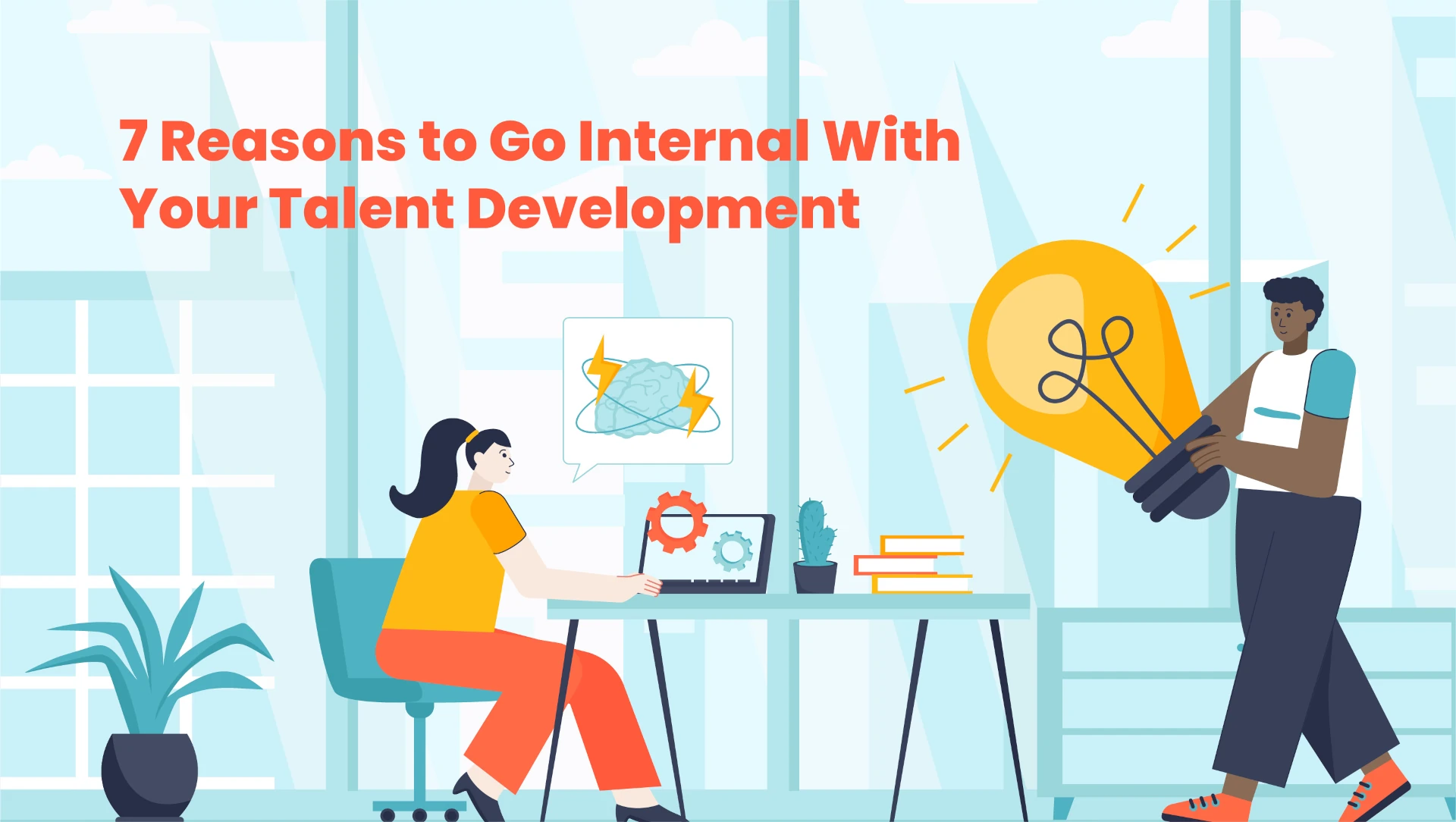
11 Jul 7 Reasons to Go Internal With Your Talent Development
Internal talent development has been on the rise in the last decade: a ManpowerGroup survey found that the number of employers investing in internal upskilling programs had risen to a majority of 54% in 2018.
Two critical elements of fixing the skills gaps and talent shortages are “Build” and “Bridge.” Build refers to internal learning, development, training, and Bridge refers to helping employees move up to new roles in the organization. Internal talent development, which emphasizes education, training, and upskilling employees within an organization, is a crucial solution that significantly improves the skills gaps problem.
The following are seven reasons to go internal with talent development:
1. Familiarity
Current employees are already familiar with and integrated into the company culture and team. Naturally, it is easier to ‘hire’ an internal employee for a missing skills gap in the workplace. This is due to their pre-existing sense of belonging in the team and knowledge of the organization, its mission, and its values. This employee is already adapted to the work style expected in the organization, which is especially useful if the organization abides by specific workflow practices, like scrum or agile work. External hires will naturally experience a growing-pains period of time in which they get accustomed to the company culture. While the internal employee would experience some adjustment to their expanded or new role, they are already working for the company and have already found their professional identity within the organization.
2. Employees’ career fulfillment
Helping employees expand their skill sets and reach new heights of their potential is rewarding. The employer gets to witness their employees blossoming within their organization, knowing that their leadership is the reason that employees are fulfilling career goals and inspiring new goals with upskilling. Internal talent development considers both the employer and the employees’ benefit by closing the skills gaps in the workplace and allowing employees to grow and expand beyond their current opportunities on the job. The employer can have discussions with their employees to help them achieve their goals and advance along their career path. As a result, the organization becomes one that cares deeply about its employees in actively helping them achieve more.
3. Growth mindset
Internal talent development inspires. Employees, challenged with new tasks and new skills demonstration, are encouraged to own a growth mindset. As a whole, the team will become more motivated to grow as individuals and as a collective, as they expand beyond their required skills and face new challenges. The team will embody a culture of lifelong learning, in which knowledge and continuous growth are encouraged amongst all employees and departments. Moreover, suppose the talent development program involves team activities or challenges. In that case, the team will be even more inclined to adopt a growth mindset as a collective group working towards a mission. With each employee developing their skills and collaboration skills, the organization as a whole embodies positive growth.
4. Retention
Studies have shown that internal talent development is an indicator of staff retention. An “engaged workforce,” one invested in employee development and training, can achieve a 59% lower staff turnover rate. Likely due to the employees’ ability to grow within the organization. In fact, a lack of career growth is the top reason why employees leave jobs. ‘Building’ and ‘bridging’ give the employee a reason to stay beyond their level of comfort in their position—they are continuously challenged and continuously growing, and therefore are more likely to stick around because of these exciting growth opportunities.
5. Empowerment
Internal talent development encourages employee empowerment and a growth mindset for lifelong learning; employees can grow more confidence, purpose, and value in the company. This more robust sense of self can inspire the employee to work harder to achieve the company mission because they will have gained personal development within the company. Employees will feel that they matter to the company and that their abilities are valued. Researchers found that employees are 34% more likely to feel committed to the company they work for if the company works to grow and develop their employees. Empowered employees make an empowered company.
6. Tailored
One significant benefit of choosing internal development over external hiring is that the development program can be tailored and customized. The company can create their own personalized talent development program tailored to their specific team’s strengths, weaknesses, interests, and goals, and also tailored to the company’s mission, vision, and values. This tailored approach to talent development ensures that participants are immersed in the experience of company culture and more connected to the ‘bigger picture’ of the company and its growth. The development activities can feature company-specific problem solving and exercises that challenge employees in a relevant way so that they can truly put their gained skills into practice at work.
7. Team collaboration
Another top reason to choose internal talent development is the opportunity for team collaboration. A development program emphasizes growth, and working as a team inspires collective learning and strong collaboration in order to achieve growth. Talent development programs challenge teams with skill-building activities, but these programs allow employees to connect, potentially across different departments. Employees have the opportunity to personally connect and get to know each other in a professional skill-building environment, which makes for more productive team collaboration in real-world work.
There are many unique benefits to internal talent development, including employees’ familiarity with company culture, building a collaborative growth mindset, and tailoring the development to the company, its employees, and its growth goals. Organizations should seriously consider going internal with their talent development to achieve a more prosperous future for both them and their employees.
